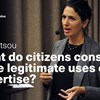users
Deep learning diffusion by infusion into preexisting technologies - Implications for users and society at large
in: Technology in Society. 63, 101396 Abstract:Artificial Intelligence (AI) in the form of Deep Learning (DL) technology has diffused in the consumer domain in a unique way as compared to previous gene, i.e., by being added to preexisting technologies that are already in use. We find that DL-algorithms for recommendations or ranking have been infused into all the 15 most popular mobile applications (apps) in the U.S. (as of May 2019). DL-infusion enables fast and vast diffusion. For example, when a DL-system was infused into YouTube, it almost immediately reached a third of the world's population. We argue that existing theories of innovation diffusion and adoption have limited relevance for DL-infusion, because it is a process that is driven by enterprises rather than individuals. We also discuss its social and ethical implications. First, consumers have a limited ability to detect and evaluate an infused technology. DL-infusion may thus help to explain why AI's presence in society has not been challenged by many. Second, the DL-providers are likely to face conflicts of interest, since consumer and supplier goals are not always aligned. Third, infusion is likely to be a particularly important diffusion process for DL-technologies as compared to other innovations, because they need large data sets to function well, which can be drawn from preexisting users. Related, it seems that larger technology companies comparatively benefit more from DL-infusion, because they already have many users. This suggests that the value drawn from DL is likely to follow a Matthew Effect of accumulated advantage online: many preexisting users provide a lot of behavioral data, which bring about better DL-driven features, which attract even more users, etc. Such a self-reinforcing process could limit the possibilities for new companies to compete. This way, the notion of DL-infusion may put light on the power shift that comes with the presence of AI in society.

Eri Bertsou: What do citizens consider to be politically legitimate uses of expertise?
Can democratic politics incorporate citizen demands for independent expertise in ways that boost legitimacy and trust in politics? Democratic governments worldwide face the dilemma of how to deal with
Eri Bertsou: Varieties of Expertise: What do citizens consider to be politically legitimate uses of expertise
Venue: Institutet för framtidsstudier, Holländargatan 13, 4th floor, Stockholm, and online Research seminar with Eri Bertsou, Assistant Professor of Political Science, University of St. Gallen (HSG).REG

Modelling as a basis for decisions with Joe Roussos
Policymakers often rely on models in order to help them plan ahead - this has been frequently discussed during the corona pandemic where new facts have changed the prerequisites for the healthcare sys
Against AI-improved Personal Memory
In: Aging between Participation and Simulation, Eds: Joschka Haltaufderheide, Johanna Hovemann and Jochen Vollmann, p: 223–234, Berlin, Boston: De Gruyter. https://doi.org/10.1515/9783110677485-014 Abstra
Homophily and Insularity Dynamics in an Echo Chambers: Computational Models for the Study of the Conspiracy Subculture in Facebook
Social Indicators Research Abstract The research focuses on developing a computational model (agent-based) to describe and analyse the structure and evolution of a conspiracy bubble within Facebook. Thedescriptiveexperimental
Seeking a reflective equilibrium in the face of disagreement
Synthese, vol. 204, 86 Abstract How is someone who seeks a reflective equilibrium to respond upon learning that others disagree with her? Regrettably, not much attention has been devoted to that questio
Uncivil speech in the social media: Democracy, Political liberalism, and the virtue of Public Reason
Constellations Introduction Initial hopes of the democratizing potential of the internet are increasingly replaced by fear that a fragmented and unedited public sphere unleashes the destructive forces o
Comparing and modeling the use of online recommender systems
Computers in Human Behavior Reports, vol 15 Abstract This study explores a new way to model the adoption of AI, specifically online recommender systems. It aims to find factors that can explain the varia
The long shadow of lobbying: ideational power of lobbying as illustrated by welfare profits in Sweden
Interest Groups & Advocacy volume 10, pp.47–67 AbstractThe weak correlation between lobbying and policy outcomes is puzzling. The main argument developed here is that the puzzle is partly caused by








